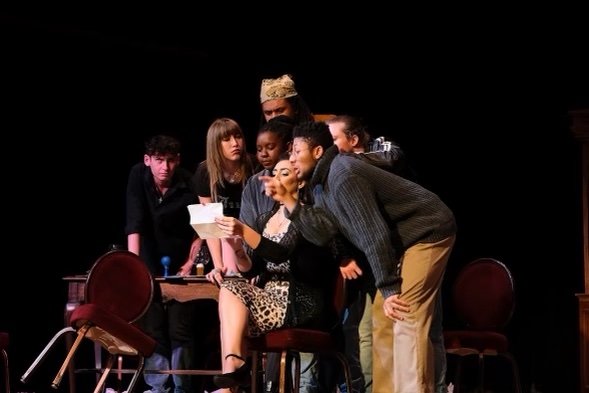The University of Michigan’s Voice and Opera Department features two fully-staged operas per semester: one large production at the Power Center for Performing Arts and one “Chamber Opera” at the McIntosh Theater in the Earl V. Moore Building. The Chamber Opera is a semester-long commitment that students audition for at the start of the term. This results in a performance of two shows at the end of the semester. This year, the class performed Giacomo Puccini’s Gianni Schicchi (1918) directed by the infamous and well-respected Mo Zhou. The show was minimal in production but grand in performance. The show boasted many great triumphs in the often-overlooked realm of Chamber Opera performances at SMTD.
Gianni Schicchi is a one-act farce that revolves around the scheming family members of the wealthy Buoso Donati. When Buoso dies and leaves behind a substantial inheritance, his relatives are desperate to claim their shares. However, they discover that Buoso has bequeathed his wealth to a monastery. In a clever twist, the family enlists the help of the cunning Gianni Schicchi to impersonate the deceased Buoso and rewrite the will in their favor. The opera explores themes of greed, deception, and the consequences of manipulating legal matters for personal gain. The music follows the trend of Puccini’s rich melodies and clever attention to lyricism. This story sparked Puccini’s writing— implementing challenging and chaotic Italian phrases to match the disorganization of the family. This requires virtuosic singers with immense attention to detail, which was apparent in this production.
This cast was filled with a variety of ages, from first-year voice majors to the highest level of education for vocal students at SMTD. Each student brought an eclectic, originally developed character into the performance. The characters had clear intentions and balanced the comedy of the opera with virtuosity and vocal integrity. Opera productions do not use microphones, and it remains astounding to me to hear the raw opulence behind these skilled voices. This production reminded me of the balancing act of opera: maintaining masterful singing while implementing physicality and strong acting choices. The cast handled this skillfully, producing a performance that demanded attention from the audience.
This opera includes the famous aria “O mio babbino caro”, sung by Schicci’s daughter, Lauretta (Cinderella Ksebati). Ms. Ksebati brilliantly maneuvered through the octave leaps and expressively romantic musical lines. Her aria was an unforgettable moment in the show. The avaricious Zita (Aria Minasian) dazzled the audience with her hearty contralto voice—a rare gift to hear onstage. Simone (Xavier Perry) conducted some of the most hilarious and memorable moments in the show. Perry’s attention to detail and capacious vocal quality were well-received by the audience, along with his sensitive comedic timing.
The set design was effective for the minimal space in the McIntosh Theater. The moment the show began, the scene and characters were immediately understood from the set before a thing was said. The crumbled papers, assorted clutter, and vintage furniture informed me of the disorganized and materialistic qualities of the family. The production could have been further enhanced with specific lighting design that was unfortunately unavailable in the McIntosh Theater.
The successful and admired production of Gianni Schicchi brings the 2023 SMTD Voice and Opera Department productions to a close. Next semester, a 2017 opera entitled Elizabeth Cree will be performed March 21-24 at the Lydia Mendelssohn Theater.
Aria Minasian (left), Jabari Kacim (center), Xavier Perry (right).
Image thanks to Lydia Qiu with University of Michigan SMTD.



